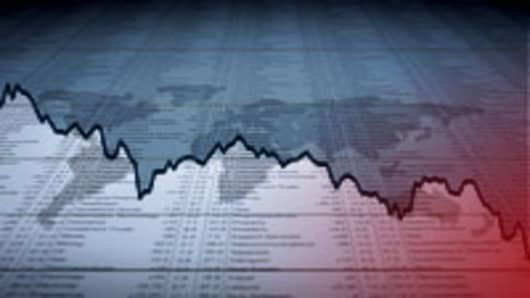An almost across-the-board flight from risk assets continued on Friday, as European shares flirted with 2-year lows. But with technical analysts saying that stocks might be oversold and continued concerns over the security of sovereign debt, some analysts say that now might be the time to buy equities.
Jonathan Tapper, author of Endgame and partner at Variant Perception, told CNBC that the evolving debt crisis in Europe was one of insolvency, not of liquidity, and that there will be no easy resolution. In that context, he said, buying sovereign bonds would be a mistake.
"I think one of the dumbest things that one could do with one's money right now is buy 10, 30 year government paper. If you buy stocks, you're able to buy companies that are able to raise prices; that are able to manage their business," Tapper said.
"It's not surprising that right now we're able to see some companies borrow at lower rates than their governments… I do think that companies can do well. Cyclically we're seeing companies reduce guidance, we'll probably see some decline in revenue and some margins being hurt, but companies are much better bets than governments right now," he added.
Bob Parker, senior advisor to Credit Suisse, told CNBC that investors' portfolios were currently long cash, long government bonds and long gold but that equity exposure had been drastically reduced."There is some investor position in corporate bonds and emerging debt, which I think quite rightly is regarded as a safe haven in this market turmoil. What we have seen very clearly in the last three weeks has been a capitulation, an indiscriminate selling of equities," he said.
"One can't call a market bottom today – but I think the right strategy, after this major sell-off, is to progressively buy on dips," Parker added.
The equity selling spree has not been entirely driven by fundamentals, Parker noted. Insurance companies looking to comply with the new Solvency Two regulation are "natural sellers of equities" as they balance their capital ratios, he said. "Mutual funds have been hit by redemptions, they are a forced seller. Investors who have had positions which have been leveraged, they have had margin calls, they are a forced seller."
Michael Browne, European portfolio manager at Martin Currie, said that it might be premature to buy now, when the market might keep falling. Markets are waiting for some kind of resolution to the European sovereign crisis, he said.
"What is it that is going to make the market really bottom out and make value investing – something that really hasn't worked for four or five years – attractive again? That obviously means we have to talk about the resolutions of the issues that have brought us to this particular impasse at this moment in time," Currie said.
"Then we come to the issue that in the short term there's going to be no action on any of those issues unless we're actually falling off the cliff. And yesterday (Thursday) wasn't the cliff."
Better macro data towards the end of the third quarter could see equities start to recover as buyers return, according to Parker.
"If we go into September, October, I think there is a high probability that in response to higher commodity prices, in response to super-easy monetary policy, then I think we could see some bottoming out in the macro data."
David Lower, an equity analyst at Faraday Research, told CNBC that fear was still the predominant theme in the market.
"In situations like this, just dump equities and either hold cash or buy gilts or treasurys," he said. "Nobody wants to own equities and they seem to be dumping across the board. Even the utilities sector, which is seen as being a really defensive sector, is being sold off. It's just fear. Nobody wants to own equities in this kind of market. There's just so much uncertainty around."
There are, however, some good stock picks out there, for those willing to do the bottom-up work. Small caps, such as DP Poland, which is rolling out the Dominos Pizza brand in the Eastern European country, will do well despite the general economic malaise, he said. "You have to try to find companies like that."
It is possible, Credit Suisse's Parker said, to build strategies that will continue to generate returns.
"One anomaly in markets at the moment is the very high level of dividend yields relative to corporate bond yields and government bond yields," he said. One strategy is to have a market neutral strategy, you then focus on the very undervalued companies which you think are going to outperform, and part of that would be to partly fund the cost of any hedging you might have, as you really focus on high dividend companies."


